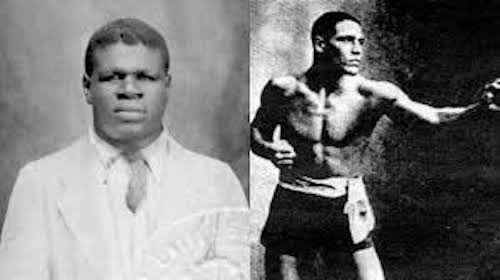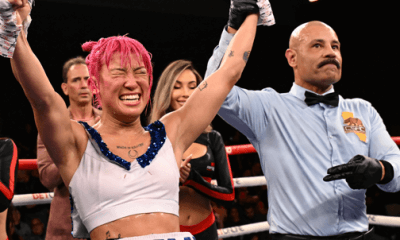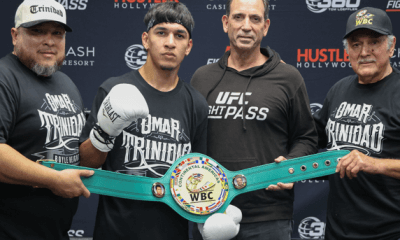Featured Articles
38 Knockdowns! Jeannette-McVey III in 1909 Was One For The Ages

A few weeks ago, my TSS colleague Ted Sares polled a number of boxing notables as to which fight they would most like to have seen in person. My snap judgment was to go with the epic first clash of Muhammad Ali and Joe Frazier, which seemed an easy and logical choice at the time. Upon further reflection I still would stick with my original selection.
But with the 110th anniversary of a mostly forgotten classic, heavyweight Joe Jeannette’s last-man-standing slugfest with Sam McVey, fast approaching on April 17, I have some cause for reconsideration. In the entire history of boxing there might never have been anything like the third of the five matchups of future Hall of Famers Jeannette (pictured on the right) and McVey, a demonstration of heart, will and endurance that went an almost-incomprehensible 49 rounds, lasted 3½ hours and featured a widely accepted total of 38 knockdowns.
“It was amazing either man was still alive,” boxing historian Gerald Early said of a prolonged torture test that had no judges and no scorecards to be tallied (there was a referee, Emile Maitrot), a real fight to the finish not all that dissimilar to gladiatorial contests in the Colosseum in ancient Rome that literally were to the death.
Jeannette, the eventual victor, nearly was knocked out in the first round of the unique bout, which was billed as being for the “Colored Heavyweight Championship of the World” and staged before 2,500 spectators in the Cirque de Paris in France’s largest city. But Jeannette, spurred on by pride, ambition and a burning desire to come away with some sort of title, even if it wasn’t the one he most wanted, arose in a dazed condition from that first flooring and continued to plug away on instinct and muscle memory. Through 17 rounds he went down 21 times, and 27 in all before his dogged refusal to yield began to turn the tide. Exhausted and thoroughly battered himself, Jeannette was declared the winner when McVey, both of his eyes swollen shut, indicated to his corner that he’d had enough. It is one thing to fight on through incredible pain and fatigue, quite another to try to do so while literally blinded.
In another remarkable exhibition of two-way determination, the “Thrilla in Manila,” Ali said that his 14-round trial by combat with the wounded but relentless beast that was Frazier was “the closest thing to death” he’d ever experienced. And it very likely was just that. But, still, you have to wonder: what if “The Greatest” and “Smokin’” Joe were asked to dig even deeper within themselves for whatever it takes to keep on keeping on to the extent that Jeannette and McVey exhibited in an era when a black fighter’s courage and resiliency were not nearly as admired, appreciated and rewarded as they should have been?
“Most doors were closed to them,” another boxing historian, the late Bert Sugar, once said of the late 19th– and early-20th century America in which poor blacks such as Jeannette, from Union City, N.J., and McVey, from Oxnard, Calif., by way of his native Waeider, Texas, came up. “There weren’t even Negro baseball league teams then. The only door open to an athletic black youth was boxing.”
Even for the more skilled practitioners of the pugilistic arts with dark skin, the pay was lousy and working conditions sometimes perilous, but it could have been worse. In a profile of Jeannette that appeared on the Fox Sports Network’s Amazing Sports Stories, Early, who also is black, said that boxing back then held an undeniable appeal to male members of his race because “if someone paid you $25 for a fight, even some kind of pickup fight, that was incredible. That was more money than the average black farm worker or sharecropper was going to make. He’d be lucky if he made $25 in a year.”
As the unseen narrator of the FSN documentary noted, “liberated by law but chained by prejudice, black Americans lived under a violent and oppressive regime: lynchings in the South, race riots in the North.” Few white fighters would even consent to test themselves against their black counterparts in such an emotionally charged climate, and when those bouts did occur the black fighter often received death threats that might or might not have been legitimate. In any case, there were always suggestions, direct or veiled, that the black fighter, in order to get more such better-paying gigs, would be well-advised to either lose or not look too good in winning.
The high and seemingly impenetrable walls of prejudice in effect obliged such gifted black heavyweights as Jeannette, McVey, Sam Langford, Harry Wills and Peter Jackson to keep beating up on one another while the heavyweight championship of the world was locked away by white fighters they believed, with some justification, to be less capable then themselves. But then one of their own, Jack Johnson, broke through to become the first black heavyweight champion when he outpointed Canada’s Tommy Burns on Dec. 20, 1908, in Sydney, Australia. Fighters such as Jeannette, who had already fought Johnson six times in non-title bouts, going 1-5 (his lone victory by disqualification) but giving a good account of himself on each occasion, now saw a clearer path to a shot at his sport’s most prestigious prize.
But Johnson, whose flamboyant personality and dalliances with white women had the effect of antagonizing the white establishment like a matador waving a red cape at a bull, was not disposed to open the door to the throne room to others of his race.
“What really could have been the Jackie Robinson of boxing turned out to be a far worse chapter in America’s history,” offered still another boxing historian, Kevin Smith, who said Johnson was more disposed to make societal waves than to calm the waters. “America’s racism was like the scab and Jack Johnson kept picking it. Every time it healed a little bit he’d pick it a little more. You know, just saying, `Hey, white America, I’m the best there is and you can’t beat me. Come and try.’ And when they sent their men at him he basically slapped them around and laughed at them while he was doing it.”
Sugar’s take on the “Galveston Giant’s” intransigence may have owed to his enjoyment of the singularity of his accomplishment, something he did not want to possibly share with the men of color whose dreams were the same as his had been, and he knew to be dangerous enough to possibly knock him off.
“Jack Johnson did everything he could to flaunt – not just being the heavyweight champion, but being the black heavyweight champion,” Sugar said. “He not only cavorted with white women, he married ’em. He would race cars 100 miles an hour down the wrong-way streets. He thumbed his nose at white society as much as he could. It was probably the worst thing that had happened to white America and they had to get their crown back.
“After he became champion he didn’t want to defend his championship against another black man. He was so proud of being the first black champion that he wanted to be the only black champion.”
To an honest workman like Jeannette – who, ironically, also was married to a white woman – Johnson’s refusal to advocate equal opportunities for all was a bitter betrayal. “Jack forgot about his old friends after he became champion and drew the color line against his own people,” Jeannette groused.
But there were fewer restrictions of movement and more money to be made in Europe, where fighters such as Jeannette and McVey were viewed more with fascination than hostility by white boxing buffs. So when French promoters dangled a purse of 30,000 francs, the equivalent of about $6,000 in the U.S., the offer was too enticing for either to decline, even given the prospect of their having to fight an unspecified number of rounds. Adjusted for inflation, that $6,000 purse would be worth $162,000-plus today, chump change to the Canelo Alvarezes and Anthony Joshuas at the top of the food chain but a king’s ransom in 1909.
“The Europeans seemed to be rather taken with African-Americans generally, with African-American culture,” Early opined. “It seemed exotic, different, primitive. They were able to better make a living over there than over here.”
So two gallant warriors – Jeannette the skilled craftsman, McVey the pure power-puncher – gave every bit of themselves until there was absolutely nothing left to squeeze out of their depleted bodies. “Whatever you make of it, it was one of the great, great fights of all time,” said Sugar, who acknowledged that no boxing commission in today’s safety-conscious times would ever consent to allow two human beings to subject themselves to what was asked of and delivered by the men who participated in the greatest fight that no living person in 2019 can claim to have seen. Nor is the abuse they heaped upon one another 110 years ago available for viewing on tape; no footage of that fight is known to exist. But it did happen, and maybe that is enough for historical purposes. Just because there is no film, tape or television coverage of Julius Caesar conquering Celtic Gauls at the Battle of Alesia in 52 BC doesn’t mean it did not happen.
“I don’t know that Joe Jeannette is overlooked, (but) he’s almost obscure,” Sugar said. “He happened before there was film; there’s none found of him. But Joe Jeannette should be remembered, and he doesn’t need film to remember him.”
Maybe so, maybe not. The passage of time, if enough of it goes by, wipes clean not only eyewitness accounts, but what happened in the distant past always loses some relevancy as more recent developments tend to relegate the old stuff to footnote status. But that doesn’t make it right. So take a moment to salute McVey (63-12-7, 48 KOs, according to Boxrec.com), who was just 37 when he died on Dec. 23, 1921, and was inducted into the International Boxing Hall of Fame in 1999, and Jeannette (birth name: Jeremiah Jennette), who lived a full and prosperous life until his death, at the age of 78, on July 2, 1958. Considering what Jeannette, who was enshrined in the IBHOF in 1997, went through during his boxing career, with an official record of 82-10-10 (69), and another 62 no-contests, it’s a shame his body and brain weren’t left to science. For those who’d like to learn more about him, there’s a 448-page book authored by Joe Botti, Joe Jennette: Boxing’s Ironman, that offers so much more than can be culled from an 1,800-word boxing web site piece.
“It’s not just a book about boxing, it’s a book about a great man who lived a great life,” said Botti. “If you’re into boxing, there are some terrific stories in the book about some great fighters. But even if you’re not, it’s a story about life and love, and, unfortunately, the racism Jennette and his family dealt with.”
Bernard Fernandez is the retired boxing writer for the Philadelphia Daily News. He is a five-term former president of the Boxing Writers Association of America, an inductee into the Pennsylvania, New Jersey and Atlantic City Boxing Halls of Fame and the recipient of the Nat Fleischer Award for Excellence in Boxing Journalism and the Barney Nagler Award for Long and Meritorious Service to Boxing.
Check out more boxing news on video at The Boxing Channel
To comment on this story in The Fight Forum CLICK HERE
-

 Featured Articles3 weeks ago
Featured Articles3 weeks agoThe Hauser Report: Zayas-Garcia, Pacquiao, Usyk, and the NYSAC
-

 Featured Articles2 weeks ago
Featured Articles2 weeks agoOscar Duarte and Regis Prograis Prevail on an Action-Packed Fight Card in Chicago
-

 Featured Articles1 week ago
Featured Articles1 week agoThe Hauser Report: Cinematic and Literary Notes
-

 Book Review5 days ago
Book Review5 days agoMark Kriegel’s New Book About Mike Tyson is a Must-Read
-

 Featured Articles4 weeks ago
Featured Articles4 weeks agoManny Pacquiao and Mario Barrios Fight to a Draw; Fundora stops Tim Tszyu
-

 Featured Articles4 weeks ago
Featured Articles4 weeks agoArne’s Almanac: Pacquiao-Barrios Redux
-

 Featured Articles3 weeks ago
Featured Articles3 weeks agoRemembering Dwight Muhammad Qawi (1953-2025) and his Triumphant Return to Prison
-

 Featured Articles4 weeks ago
Featured Articles4 weeks agoOleksandr Usyk Continues to Amaze; KOs Daniel Dubois in 5 One-Sided Rounds



















